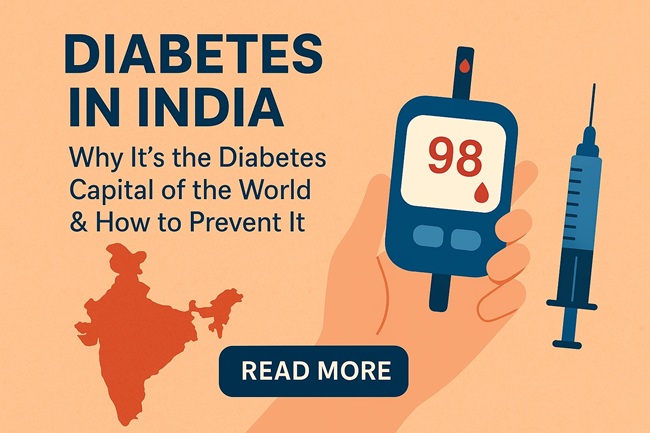Diabetes has become one of the most pressing health concerns of our time, and unfortunately, India holds an unwanted title, the Diabetes Capital of the World. With millions of people diagnosed and even more living unaware of their condition, diabetes in India has silently grown into an epidemic. But why are Indians so vulnerable? How can we recognize it early? And more importantly, what can we do to protect ourselves and our families?
This article aims to simplify the complex issue of diabetes in India, its causes, warning signs, lifestyle solutions, and preventive strategies, so that everyone can understand and take proactive steps towards better health.

Why is India the Diabetes Capital of the World?
According to the International Diabetes Federation (IDF), over 100 million people living with diabetes in India and nearly 136 million with pre-diabetes. That means nearly 1 in every 10 Indians is diabetic, and the numbers are still rising.
But the real concern is lack of awareness. Studies show that almost 50% of people with diabetes in India don’t even know they have it until serious complications arise. This silent progression is what makes diabetes so dangerous.
Some key reasons India has become the diabetes hub are:
1. Genetics and Body Type
Indians tend to have higher body fat percentage even at lower body weights compared to Westerners. This “thin-fat” body type increases insulin resistance.
2. Urban Lifestyle
Most people living in cities have desk jobs, minimal physical activity, and irregular eating habits, a perfect recipe for diabetes.
3. Dietary Habits
High reliance on rice, wheat, fried snacks, sweets, and sugary drinks increases blood sugar levels. Festive culture and frequent indulgence also contribute.
4. Stress and Lack of Sleep
Modern work culture, late night lifestyles, and chronic stress raise cortisol levels, which disturb insulin function.
5. Early Onset
Unlike the West, where diabetes usually develops after 50, in India it often starts in the 30s and 40s, making the long term damage even worse.
How Many Indians Are Affected by Diabetes?
- 100+ million diabetics in India (second only to China).
- 136 million pre-diabetic people who may develop diabetes if preventive steps are not taken.
- Every fifth diabetic in the world is Indian.
- By 2045, India may have 150 million diabetics, according to health experts.
This is not just a medical issue, but also a social and economic challenge. Diabetes leads to heart problems, kidney failure, vision loss, amputations, and reduced life expectancy. It also puts a heavy financial burden on families.
How Can We Detect Diabetes Early?
Diabetes often develops silently. But there are warning signs:
- Increased thirst and frequent urination
- Unexplained weight loss or gain
- Fatigue and weakness
- Blurred vision
- Slow-healing wounds
- Frequent infections (skin, gums, urinary tract)
If you notice these symptoms, it’s crucial to get your blood sugar checked. Even if you feel fine, a routine checkup after age 30 is recommended, especially if you have a family history of diabetes.
Tests for early detection include:
- Fasting Blood Sugar (FBS)
- Postprandial Blood Sugar (PPBS) (after meals)
- HbA1c Test (average sugar levels over 3 months)
What Changes Do We Need to Make?
Diabetes is largely preventable and manageable with lifestyle changes. Here’s what every Indian family should adopt:
1. Balanced Diet
- Prefer whole grains (brown rice, millets, oats) over refined flour.
- Include fiber-rich foods like vegetables, legumes, and fruits.
- Limit sugary drinks, sweets, fried foods, and packaged snacks.
- Add protein sources like pulses, eggs, fish, and lean meat.
- Use healthy oils (mustard, olive, groundnut) instead of refined oils.
2. Regular Exercise
- At least 30–45 minutes of brisk walking daily.
- Yoga, cycling, swimming, or strength training 3–4 times a week.
- Encourage children to play outdoor games instead of screen time.
3. Routine Health Checkups
- Annual blood sugar check after 30.
- Regular eye and kidney check for diabetics.
4. Weight Management
- Maintaining a healthy waistline is more important than overall weight.
- Men should aim for waist size < 90 cm, women < 80 cm.
5. Stress Management & Sleep
- Practice meditation, yoga, or simple breathing exercises.
- Ensure 7–8 hours of sleep daily.
6. Quit Smoking and Limit Alcohol
Both increase risk of diabetes complications.
Healthy Routine from Early Childhood
To prevent the diabetes in India epidemic from growing, healthy habits must begin at home, right from childhood.
- Active childhood: Encourage outdoor play, cycling, and sports.
- Healthy meals at home: Reduce junk food, sugary drinks, and deep-fried snacks.
- Proper sleep schedule: Children should get 8–10 hours of sleep.
- Education about health: Teach children the importance of balanced food and exercise.
- Family role model: Parents who follow healthy routines inspire kids to do the same.
Living with Diabetes – It’s Not the End
Being diagnosed with diabetes is not the end of the world. With the right lifestyle and medical guidance, diabetics can live a long and healthy life. Many people even reverse their early stage Type 2 diabetes with diet and exercise.
Key things to remember:
- Take medicines and insulin as prescribed.
- Monitor blood sugar regularly.
- Maintain a healthy diet and exercise routine.
- Never ignore small health issues, they may be linked to diabetes.
Diabetes in India : Conclusion
India’s rapid rise in diabetes cases is alarming, but not unstoppable. By spreading awareness, encouraging early detection, and adopting healthier lifestyles, we can fight this epidemic. Remember, diabetes is not just about sugar, it is about how we live our lives daily. Small changes, if started early, can protect not just individuals but also the future generations of India.
As the saying goes: “Prevention is better than cure.” Let’s take responsibility for our health today so that we don’t pay the price tomorrow.
Disclaimer: This content is for informational purposes only and should not replace professional medical advice.

Hi, I’m Prashant Jain — a curious soul, storyteller, and content creator at heart.I’ve always been drawn to the world of entertainment, travel, sports, health & lifestyle — not just as a writer, but as someone who genuinely lives these experiences. Whether I’m binge-watching the latest OTT series, exploring offbeat spiritual destinations in India, or diving deep into wellness routines and cricket match insights, I love sharing what I discover with like-minded readers.
PopNewsBlend is my way of blending personal journeys with meaningful stories — ones that inform, inspire, and keep you ahead of the curve. Everything I write comes from real observations, hands-on experiences, and a deep passion for understanding the world around us.
Discover more from Popnewsblend
Subscribe to get the latest posts sent to your email.








Your article helped me a lot, is there any more related content? Thanks!